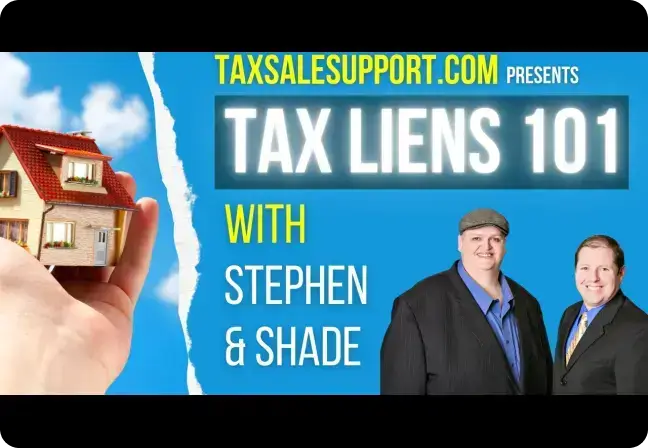All Categories
Featured
Table of Contents
If you have an interest in the tax lien foreclosure procedure, you should speak to an attorney so you recognize and weigh the dangers of this kind of financial investment. - tax lien investing secrets
Tax obligation lien sales are one way that cities and areas attempt to redeem several of the general public bucks they've spent preserving these homes abandoned by private proprietors. As we'll clarify in this post,. As soon as residential property tax obligations are thought about delinquent, city governments usually concentrate on offering notification of delinquency and attempting to collect the unpaid quantities from the owner.
This procedure generally takes years - us tax liens investing. If an owner has actually left and hesitates to pay taxes or maintain the building, the city has to spend tax obligation dollars to keep the home. These costsboarding up the structure, mowing disordered yard and weeds, responding to fire and cops contacts the home, and moreadd up

Proprietors that have actually fallen on tough times definitely need every initiative to keep them out of misbehavior and in their homes. Generally, if the residential or commercial property is uninhabited and scrubby, we have to presume the owner has selected to abandon their passion in the property and that they are "reluctant" to pay (though conditions earlier in the process may have forced their hand).
Investing In Tax Liens In Texas
Take, for instance, a single-family home where the proprietor has long since strolled away. For years the city government has actually had to action in and eliminate trash discarded in the backyard, board up the doors and home windows, and react to telephone calls regarding illicit activity on the residential or commercial property. All these services set you back the city government taxpayer dollars.
In many states, those costs can be accumulated in the very same way as the unpaid tax obligations, however not in all. In a tax lien sale (or tax certification sale) the local federal government typically holds a public auction where the winning prospective buyer agrees to pay the most money for the right to apply the tax obligation lien, starting with a minimal bid of at least the taxes had, plus applicable rate of interest, costs, and costs.

When a federal government sells the tax obligation lien they are generally marketing to a personal buyer the city government's authority to gather the debt in exchange for in advance payment of the taxes owed. The customer's acquisition generally includes the capacity to make future interest, in addition to recover related charges and expenses incurred by the customer, if the homeowner pays the tax obligation debt.
This is, basically, privatization of a core government feature: tax obligation collection. Tax lien sales are especially poor when it concerns uninhabited, abandoned, and scrubby residential properties because they prolong the period before a building can be relocated right into the hands of a new, much more responsible owner. Private tax obligation lien customers hold the financial obligation, but they do not own the titlethe lawful right to ownership of the propertyand oftentimes, they have no rate of interest in getting it.
Tax Lien Investing For Beginners
Thinking about budget cuts, city governments in many states have decreased in-house property tax collection and enforcement efforts and looked to tax obligation lien sales as a quick mixture of profits - tax lien deed investing (how does tax lien investing work). Several regions pick or are mandated by the state to sell tax liens since it contracts out collection and frequently brings in very required cash money previously in the collection procedure
By moving the city government's rate of interest in and enforcement of the tax lien to a private purchaser, local governments lose a lot of their adaptability: adaptability to obtain uninhabited properties that the exclusive market does not want, or to help the proprietor stay clear of shedding their residential property. With vacant residential or commercial properties, there is a much greater chance that the private purchaser isn't curious about the home itself.
Tax obligation lien sales can trigger harm in traditionally disinvested locations. In a depressed housing market, less proprietors have the ability to retrieve the quantity of the financial obligation offered to a tax obligation lien buyer. These areas are ripe for a various kind of tax obligation lien investorspeculative proprietors seeking to obtain homes on the affordable by confiscating on the residential property tax lien, milking what little equity is left by renting a substandard property to susceptible tenants, and afterwards abandoning the property when they've earned back their investment.

Not all state legislations give city governments the power to intervene in this cycle. In any case, the home stays vacant and in limbo, all the while imposing significant expenses on its neighbors and taxpayers. It's understandable that lots of regional federal governments transform to tax obligation lien sales since they assist money essential public services.
If the neighborhood government instead markets the residential property (also known as the "tax action"), instead than the tax obligation financial debt, then they are in control of what happens to the residential property and the enforcement procedure if the proprietor proceeds to not pay the real estate tax owed. The government will certainly supply the owner a practical time to pay back the tax financial obligation, after which the government will seize its interest in the tax obligation lien and the owner's right of redemption.
From their beginning, these public auctions were places for investors to make money via exploitation. In very early 20th-century cities, infamous "tax sharks" like Chicago's Jacob Glos and New York's Charles Wiltsie amassed lot of money by purchasing up ratings of tax liens on houses, charging their owners exorbitant amounts to remove the lien, or waiting until the deadline for negotiation passed and asserting the act.
Investing In Tax Lien Certificates

Telephone calls to abolish tax obligation lien sales and overhaul tax obligation misbehavior laws have actually regularly emerged. Typically, they have actually come in reaction to instances of poor, usually senior house owners that lost their homes to dishonest tax obligation buyers over small tax debts. With a couple of exceptions, state legislatures have stood up to architectural reforms (investing in real estate tax lien).
Those that have actually settled their home loans (mostly seniors or individuals who had inherited a household home) should also locate the money to pay real estate tax. This describes why 70 percent of the homes marketed at tax lien sales are possessed outright. It is well hobby for states to embrace a more humaneand a lot more effectivesystem for home tax enforcement.
Table of Contents
Latest Posts
Back Taxes Foreclosure Homes
Tax Lien Investing Florida
Tax Foreclosure Homes
More
Latest Posts
Back Taxes Foreclosure Homes
Tax Lien Investing Florida
Tax Foreclosure Homes